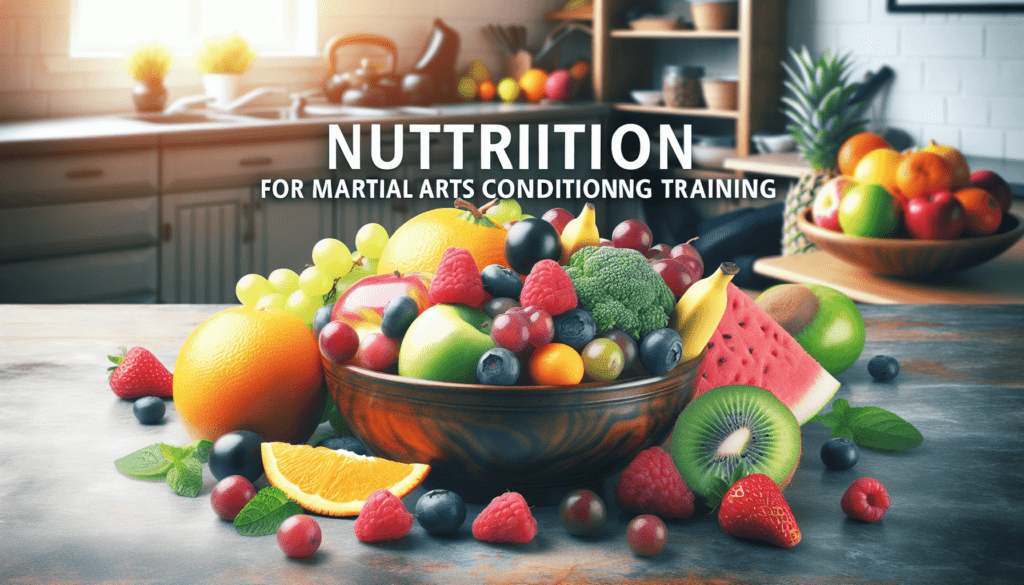Are you ready to take your MMA conditioning to the next level? Look no further! In this comprehensive guide, we will provide you with all the essential tips and tricks to fuel your body for optimal performance in the octagon. From pre-workout snacks to post-fight recovery meals, we’ve got you covered. Get ready to discover the secrets behind a well-balanced diet that will help you enhance your endurance, strength, and overall performance. So, grab your favorite protein shake and join us on this nutrition journey tailored specifically for MMA athletes!
Introduction
Welcome to the ultimate guide to nutrition for MMA (Mixed Martial Arts) conditioning! In this comprehensive article, we will delve into the various aspects of nutrition that are crucial for optimal performance and recovery in MMA. Whether you’re a professional fighter or a passionate enthusiast, understanding the importance of nutrition will undoubtedly take your training and overall performance to the next level. So, let’s dive in!
Understanding the Importance of Nutrition in MMA Conditioning
When it comes to MMA, proper nutrition plays a pivotal role in enhancing performance, improving recovery, and optimizing overall conditioning. The demands of this intense combat sport require a well-rounded approach to nutrition that focuses on adequate caloric intake, macronutrient and micronutrient balance, hydration, and weight management. By fueling your body with the right nutrients at the right times, you can maximize your energy levels, optimize muscle growth and repair, and maintain a healthy body composition.

Fueling the Body for Optimal Performance
Caloric Intake
To perform at your best, it’s important to fuel your body with the appropriate number of calories. The caloric needs of an MMA athlete depend on various factors, including body weight, training intensity, and goals. Generally, a caloric intake that meets the energy demands of your training and supports your body’s metabolic processes is essential. Consulting with a sports nutritionist or dietitian can help you determine your specific caloric needs and ensure you’re striking the right balance.
Macronutrients
Macronutrients, namely carbohydrates, proteins, and fats, are the key components of a well-rounded MMA diet. Carbohydrates serve as the primary source of fuel for high-intensity athletic activities, such as MMA. Including a variety of complex carbohydrates such as whole grains, fruits, and vegetables in your meals will provide you with sustained energy throughout your training sessions. Proteins are essential for muscle repair and growth, and incorporating lean sources like chicken, fish, tofu, and beans into your diet will support optimal recovery. Don’t forget about healthy fats! Including sources like nuts, avocados, and olive oil in moderation can help provide sustained energy and support hormone production.
Micronutrients
In addition to macronutrients, it’s important not to overlook the importance of micronutrients in your diet. These include vitamins, minerals, and antioxidants that play crucial roles in maintaining overall health and supporting optimal performance. Consuming a wide variety of fruits, vegetables, whole grains, and lean proteins will help ensure you’re getting an adequate intake of these important micronutrients.
Pre-Workout Nutrition
Timing of Meals
When it comes to pre-workout nutrition, timing is key. Consuming a mixed meal containing carbohydrates and proteins about 2-3 hours before your training session can help provide sustained energy and promote muscle repair. However, if you find yourself with limited time, consuming a smaller snack containing easily digestible carbohydrates and a small amount of protein about 45-60 minutes before your workout can still provide a boost of energy and aid in performance.
Choosing the Right Carbohydrates
The type of carbohydrates you consume before your workout can greatly impact your performance. Opt for complex carbohydrates, such as whole grains, sweet potatoes, and brown rice, which are rich in fiber and provide a steady release of energy. Avoid sugary and processed carbohydrates, as they can lead to a rapid rise in blood sugar, followed by a crash in energy levels.
Protein Requirements
Including a source of protein in your pre-workout meal or snack is essential for muscle repair and growth. Aim for around 20-30 grams of high-quality protein, such as lean chicken, fish, or Greek yogurt. This will ensure that your muscles have the necessary amino acids to repair and recover after intense training sessions.

Hydration and Electrolyte Balance
The Role of Hydration in Performance
Proper hydration is crucial for both performance and overall health. In MMA, where intense sweating and fluid loss are common, staying hydrated becomes even more important. Dehydration can negatively impact your energy levels, endurance, mental focus, and overall performance. Aim to drink enough fluids throughout the day to maintain a pale, straw-colored urine color. During training sessions, replace lost fluids by sipping water or electrolyte-rich beverages.
Electrolyte Replenishment
Electrolytes, such as sodium, potassium, and magnesium, are minerals that play a vital role in fluid balance, muscle contractions, and nerve function. Replenishing electrolytes becomes essential when you’re engaging in intense training or competing. Consuming sports drinks or incorporating electrolyte-rich foods, such as bananas, oranges, and leafy greens, can help replenish these important minerals and maintain proper electrolyte balance.
Post-Workout Recovery Nutrition
The Importance of Protein
After intense training or a fight, your muscles need protein to repair and recover. Consuming a combination of protein and carbohydrates within 30 minutes to an hour after your workout can greatly enhance recovery and restore glycogen levels. Aim for about 20-30 grams of protein from sources like lean meats, fish, eggs, or a high-quality protein shake, along with a serving of carbohydrates to replenish energy stores.
Carbohydrate Timing and Refueling
In addition to protein, replenishing your glycogen stores with carbohydrates is important for optimal recovery. Focus on consuming carbohydrates within the first hour after your workout, as this is when your muscles are most receptive to glycogen replenishment. Including complex carbohydrates such as whole grains, fruits, or starchy vegetables in your post-workout meal will provide a steady release of glucose and support optimal recovery.
Weight Management and Cutting
Balancing Caloric Intake and Output
Maintaining a healthy weight and body composition is crucial in MMA. To achieve this, it’s important to balance your caloric intake with your energy output. Understanding the number of calories you need to maintain your weight and adjusting this intake based on your training volume and goals is essential.
Creating a Caloric Deficit
When aiming to cut weight, creating a caloric deficit is necessary. This can be achieved by reducing your caloric intake or increasing your energy expenditure through increased training or physical activity. However, it’s important to approach weight cutting in a healthy and sustainable manner. Consulting with a professional, such as a nutritionist or dietitian, can ensure you’re cutting weight safely while still maintaining proper fueling and performance.
Nutrition Strategies for Cutting Weight
When cutting weight, it’s important to focus on nutrient-dense foods that provide essential nutrients while keeping calorie intake in check. Prioritizing lean proteins, fibrous vegetables, healthy fats, and complex carbohydrates will help you feel satisfied while staying within your calorie goals. Additionally, keeping a food diary and tracking your intake can provide valuable insights into your eating habits and help you make necessary adjustments to achieve your weight goal.
Supplementation for MMA Athletes
Key Supplements for Performance and Recovery
While proper nutrition should always come from whole foods, certain supplements can complement your diet and support performance and recovery. Some key supplements for MMA athletes include protein powder, branched-chain amino acids (BCAAs), creatine, and fish oil. However, it’s important to consult with a healthcare professional or sports nutritionist before incorporating any supplements into your regimen.
Ensuring Supplement Safety
When considering supplements, it’s crucial to prioritize safety and quality. Choose supplements from reputable brands that undergo rigorous testing for purity and quality. Additionally, always follow the recommended dosage guidelines and be aware of any potential interactions with medications or existing health conditions. Remember, supplements should support a well-rounded diet and training regimen, not replace them.
Meal Planning and Preparation
Importance of Meal Planning
Meal planning is essential for MMA athletes, as it ensures you have access to nutritious meals and snacks throughout the day. With a busy training schedule, having pre-planned meals will help you avoid relying on unhealthy convenience foods. Set aside time each week to plan your meals and create a shopping list to ensure you have all the necessary ingredients on hand.
Tips for Meal Prepping
Meal prepping can be a game-changer for MMA athletes. By dedicating a few hours each week to prepare and portion your meals, you can save time and ensure you have balanced, nutritious options readily available. Invest in high-quality food storage containers, cook in bulk, and divide your meals into individual servings for easy grab-and-go access.
On-the-go Nutrition Strategies
Life as an MMA athlete often means being on the go. Whether you’re traveling for a competition or have a packed training schedule, having strategies in place for on-the-go nutrition is vital. Pack portable snacks such as protein bars, nuts, or dried fruits, and carry a water bottle to stay hydrated throughout the day. Additionally, researching local restaurants or grocery stores at your destination can help you find nutritious options when you’re away from home.
Conclusion
Congratulations on completing this comprehensive guide to nutrition for MMA conditioning! By now, you have a solid understanding of the importance of nutrition in optimizing your performance, enhancing recovery, and achieving your weight goals in the world of MMA. Remember, proper fueling, adequate hydration, and a balanced diet should always be the foundation of your training regimen. Consult with a sports nutritionist or dietitian to personalize your nutrition plan based on your specific needs and take your MMA journey to new heights. Best of luck on your path to success!

